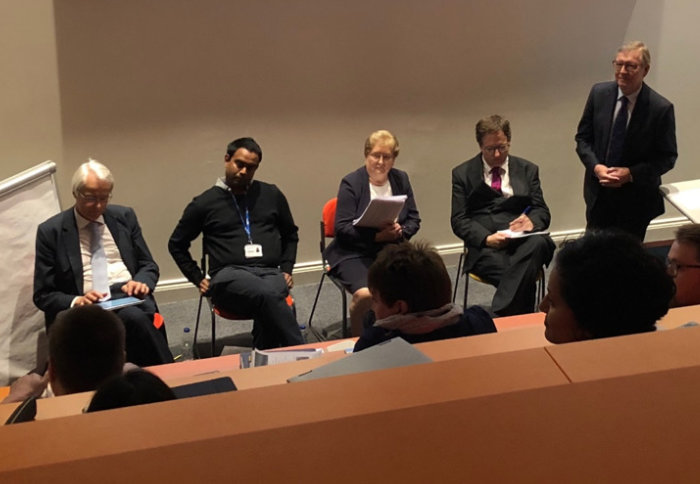Facing up to patient safety challenges

Sir Robert Francis QC, Naresh Serou, Margaret Murphy and Henry Charles participate in a panel discussion, chaired by Dr Mike Durkin.
A unique panel as part of the Patient Safety Masters, pushing boundaries around key issues around patient safety incidences.
‘Nothing is faced unless it is challenged’ was the consensus of a panel discussion hosted by the NIHR Imperial Patient Safety Translational Research Centre as part of the Social Impact of Patient Safety Masters’ Module in late May.
The expert panel, chaired by Senior Advisor on Patient Safety Policy and Leadership at Imperial: Dr Mike Durkin, drew on expertise and experiences of a Health Services Researcher and clinician: Naresh Serou (a second victim), External Lead Advisor from the WHO Patients for Patient Safety Programme: Margaret Murphy (a first victim), the Chairman of the public inquiry into the Mid Staffordshire Hospital scandal: Sir Robert Francis QC and a leading personal injury and clinical negligence barrister: Henry Charles.
It is not often that students have an hour’s interactive discussion with such key players in the patient safety world, who bring a wealth of patient safety experience, including sharing personal accounts of receiving and making mistakes in care and working through the repercussions. It’s a miracle they were all free on the same day!
Two important notions that were explored in this diverse panel discussion were ‘second victims’ and ‘shared abandonment’. In healthcare, the second victim refers to the staff member involved in an adverse patient safety event who experiences the trauma of harm and suffers through the emotional aftermath of the event. The first victim being the patient and family members. Often the healthcare professional is expected to continue with high pressured medical work immediately and might not receive the psychological support to deal with the guilt of harming a patient.
Margaret spoke of the experience of her son’s death as a result of medical error. When she bumped into one of the doctors involved, in the lift, a few weeks after Kevin had passed and she explained who she was, he practically ran out of the lift. Professionals, patients and family members can experience shared abandonment, where there is not the time or support to recover from incidences and individuals can be blamed with the involvement of regulators and civil/criminal law.
Naresh shared his story of when he and his mentor had a lack of communication and left a swab inside a patient during surgery, leading to this patient returning with sepsis and needing a second surgery, but thankfully recovering from the incidence. Naresh’s story exposed a culture of fear within his team at the time and a concerning lack of transparency afforded to those involved during the follow up. This led to emotional distress and a feeling of isolation with a lack of an outlet or support network to communicate what those involved were going through. Naresh’s life path changed since the incident; he decided to talk about his story and carry out research into second victims. Sadly, his mentor ended up leaving the medical profession for good, which is another tragedy.
In healthcare, we want to encourage ‘duty of candour’ (honesty with patients) and professionals facing up to responsibility and accountability, which in turn could help reduce their guilt and allow them to cope and learn. When safety incidences occur, we hope that there is support and freedom for the patient, family members and healthcare professionals to speak up and be listened to so that incidences can be learnt from, to reduce the likelihood of similar errors happening again.
On twitter after the panel, the students mentioned that it was a “fantastic session with amazing learning” and that they were “grateful and privileged to be there.” The key learnings for the students during the session were to:
- Examine the difficulties of promoting duty of candour, when a blame culture still exists in society;
- Explore the impact of incidences on professionals (e.g. second victims) and the notion of shared abandonment;
- Gain an understanding of the role of the regulator and civil/criminal law in patient safety incidences.
We are looking forward to running similar panel discussions in future modules to spark conversations and holistic learning. To find out more about the MSc in Patient Safety visit the website.
Article text (excluding photos or graphics) © Imperial College London.
Photos and graphics subject to third party copyright used with permission or © Imperial College London.
Reporter
Jo Seed
Institute of Global Health Innovation
Anna Lawrence-Jones
Department of Surgery & Cancer